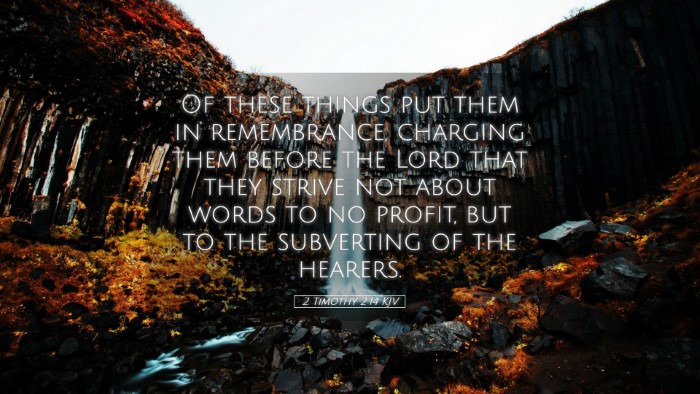Commentary on 2 Timothy 2:14
Verse: "Remind them of these things, charging them before the Lord not to strive about words to no profit, to the ruin of the hearers."
Introduction
This passage from 2 Timothy is a significant exhortation from the Apostle Paul to his young protégé, Timothy. In it, Paul emphasizes the importance of sound teaching and the dangers of engaging in fruitless disputes. Throughout the commentaries of Matthew Henry, Albert Barnes, and Adam Clarke, we find a rich tapestry of insights that serve to deepen our understanding of this text.
The Call to Remind
Matthew Henry’s Perspective: Henry points out that the opening command to "remind them," indicates the necessity of continual reinforcement of key doctrines. He considers that the repetition of truth is essential in the ministry as it combats forgetfulness and complacency among believers.
Albert Barnes’ Insight: Barnes adds that this reminder is rooted not only in teaching but also in living out the truth. He urges that ministers should constantly point back to the core of the gospel, ensuring that practical application follows the teaching.
Adam Clarke’s Analysis: Clarke builds on this idea by noting that the act of reminding signifies pastoral responsibility. He elaborates that effective ministry involves continually bringing believers back to the foundational truths of faith, particularly in times of confusion or error.
Importance of Sound Doctrine
Paul's exhortation underlines the necessity of adhering to sound doctrine. The mention of “things” serves to represent the broader gospel truths.
- Henry’s Reflection: Henry stresses that sound doctrine must be upheld to prevent error from creeping into the church, marking this as essential for spiritual health.
- Barnes' Warning: He notes that doctrine that is not regularly revisited can lead to pastoral and congregational drift.
- Clarke’s Stance: He indicates that a solid understanding of doctrine equips believers to confront heresy effectively.
Avoiding Fruitless Controversy
The Dangers of Striving About Words: The Apostle Paul clearly admonishes Timothy to avoid fruitless arguments, which can lead to the ruin of followers.
- Henry on Contentiousness: Matthew Henry states that disputes over minor issues distract from the core message of the gospel and result in damaging the unity of the church.
- Barnes’ Concerns: Barnes highlights that such controversies do not lead to any spiritual profit; rather, they sow discord and confusion among believers.
- Clarke’s Warning: Clarke warns that when theological debates become contentious, they can lead to spiritual devastation, weakening the faith of the audience.
The Role of Pastoral Charge
Paul’s charge to Timothy emphasizes an authoritative aspect to teaching, indicating the weighty responsibility of shepherding a congregation.
- Henry’s View on Authority: He illustrates that true pastors must maintain a position of authority that is grounded in the Word of God, rather than in personal opinion.
- Barnes Reiterating Duty: Barnes reiterates that the pastoral role is deeply impactful, suggesting that teachers must guide their flock with both truth and gentleness.
- Clarke on Accountability: Clarke interprets this charge as a reminder of accountability before God, indicating that teaching is a serious matter that carries weight before the Lord.
Conclusion
The charge to Timothy encapsulates enduring principles for all who minister the Word of God. The call to remind, the avoidance of trivial disputes, and the emphasis on sound doctrine are all crucial for the health of the church. As pastors, students, theologians, and Bible scholars reflect on this verse, may they be called to deeper commitment in their teaching and pastoral care. The insights gleaned from Matthew Henry, Albert Barnes, and Adam Clarke provide both a warning and a guide in these pursuits.


